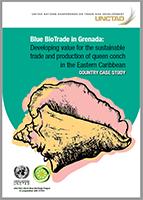
Queen conch (Strombus gigas), known as "lambi" in Grenada, is an appreciated seafood delicacy with additional non-food uses, including therapeutical products and handicrafts. While global demand for queen conch meat is booming, small-scale coastal producers in Grenada could further improve the income earned from this resource by exploring sustainable conch markets, seeking cost reduction methods, and adding value to conch byproducts.
So far, Grenada has been subject to two recommendations to suspend trade in queen conch under: (a) the CITES Review of Significant Trade, which has prohibited the export of conch to receiving countries since May 2006; and (b) a suspension of trade in all CITES-listed species from Grenada (which includes the queen conch), due to failure to submit annual trade reports since 2013.
In 2020, UNCTAD, OECS (with the support of the European Union) and CITES joined forces to design a pilot project to test the application of the revised UNCTAD BioTrade Principles and Criteria (2020) to the marine environment, focusing on the queen conch value chain in the countries of Grenada, Saint Lucia and Saint Vincent and the Grenadines.
The Blue BioTrade Project aims to promote trade and investment in marine biological resources in line with social, economic and environmental sustainability criteria, known as the BioTrade Principles and Criteria (revised in 2020) (UNCTAD, 2018, 2020).
Integrating BioTrade Principles and Criteria into the marine environment can promote the sustainable use of scarce and vital oceanic living resources (at the genetic, species and ecosystem levels), and can lessen the negative impacts of human and economic activity over marine ecosystems.
Blue BioTrade is a spinoff of UNCTAD’s Oceans Economy and Fisheries Programme and the BioTrade Initiative.


